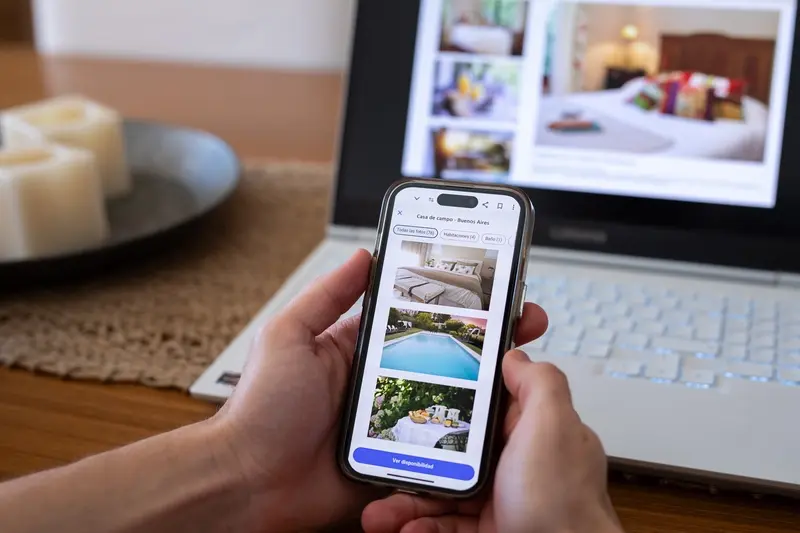iPhone vs Android App Development: Which Platform Should You Choose First?
Over 6 billion smartphone users worldwide face the same question when launching their first mobile app: iPhone or Android first? This choice can make or break your app's success, affecting everything from development costs to user engagement rates. What surprises most people is that the "right" platform isn't always the most popular one—it depends entirely on your specific goals, budget, and target audience.
The platform decision becomes even trickier when you consider that iPhone users typically spend 2.5 times more on apps than Android users, yet Android holds nearly 75% of the global market share. Both platforms have their champions: apple iPhone app developers swear by iOS's streamlined development process, while Android specialists highlight the platform's flexibility and massive reach.
The biggest mistake I see startups make is trying to launch on both platforms simultaneously without understanding the unique challenges each one presents
This guide will walk you through everything you need to know about choosing between iPhone and Android development for your first app launch. We'll explore the real costs (not just the obvious ones), examine user behaviour patterns that could impact your revenue, and break down the technical requirements that might influence your timeline. By the end, you'll have a clear framework for making this decision based on your specific situation rather than generic advice.
Understanding the Differences Between iPhone and Android Development
When I explain iPhone and Android development to clients, I like to keep things simple—these platforms are built completely differently, and that affects everything from how long your app takes to build to how much it costs. iPhone apps are built using Swift or Objective-C programming languages, whilst Android apps use Java or Kotlin. Think of it like speaking different languages; you need different skills for each one.
The app stores work differently too. Apple's App Store has stricter rules about what apps they accept, which means longer approval times but generally higher quality standards. Google Play Store is more relaxed, so you can get your Android app live faster, but there's more competition and variation in quality.
Key Technical Differences
Here's what really matters when choosing your platform:
- iPhone apps only need to work on Apple devices—fewer screen sizes and hardware variations
- Android apps must work across hundreds of different devices from Samsung, Google, Huawei and others
- Apple users typically update their phones more often, so you're dealing with newer software
- Android has a much wider range of older devices still in use
Development Environment Differences
iPhone development requires a Mac computer and Xcode software—no way around that one. Android development is more flexible; you can use Windows, Mac, or Linux computers with Android Studio. This affects your setup costs and team requirements right from the start.
The Benefits of Starting with iPhone App Development
When clients ask me which platform to choose first, I often find myself leaning towards iPhone development—and there are some solid reasons why. Apple's ecosystem is like a well-oiled machine; everything works together seamlessly, which makes development more straightforward for your team.
The biggest advantage? You're dealing with far fewer device variations. While Android developers need to worry about hundreds of different screen sizes and hardware configurations, iPhone developers work with a limited range of devices. This means less testing, fewer bugs, and a smoother development process overall.
Higher Revenue Potential
Here's something that might surprise you—iPhone users typically spend more money on apps. The data shows that iOS users are more likely to make in-app purchases and pay for premium features. If your business model depends on app sales or subscriptions, starting with iPhone development often makes financial sense.
Faster Time to Market
Building for iPhone first means you can get your app to market quicker. The streamlined development process, combined with Apple's consistent design guidelines, helps teams move faster. You can validate your app idea, gather user feedback, and start generating revenue whilst planning your Android version.
Start with iPhone if you're targeting premium users or your app relies on paid features—the higher spending behaviour of iOS users can significantly impact your bottom line.
Why Android Development Might Be Your Best First Choice
Now here's where things get interesting—Android might actually be the smarter starting point for many businesses, and I'll tell you why. The numbers don't lie: Android holds roughly 70% of the global mobile market share, which means you're potentially reaching a much larger audience right from day one.
Lower Barriers to Entry
Getting your Android app into the Google Play Store is refreshingly straightforward compared to Apple's approval process. Google's review typically takes just a few hours to a couple of days, whilst Apple can keep you waiting for up to a week (sometimes longer if they find issues). The one-time Google Play developer fee of $25 is also significantly cheaper than Apple's annual $99 charge.
More Flexible Development Options
Android development gives you more freedom in how you build your app. You can develop on Windows, Mac, or Linux—you're not locked into Apple's ecosystem from the start. The platform is also more forgiving when it comes to app functionality and design guidelines, giving you room to experiment and innovate.
For businesses targeting emerging markets or price-conscious consumers, Android is often the obvious choice. Many Android users are also more willing to try new apps and provide feedback, which can be invaluable during your app's early stages. If you're bootstrapping your mobile strategy or working with a tight budget, Android's lower entry costs and faster deployment might just give you the head start you need.
Development Costs and Timeline Considerations
Let's talk money and time—two things that keep business owners awake at night! When choosing between iPhone and Android development, your budget and timeline will play a massive role in your decision.
iPhone app development tends to be more straightforward from a cost perspective. You're building for a smaller range of devices with consistent screen sizes and operating systems. This means your apple iphone app developer can work more efficiently, often completing projects 20-30% faster than Android equivalents. The development tools are mature, the testing process is streamlined, and you won't be pulling your hair out dealing with device fragmentation issues.
Android's Hidden Time Costs
Android development can initially appear cheaper—after all, you don't need expensive Mac hardware to get started. But here's where it gets tricky. Testing across hundreds of different Android devices takes time. Lots of time. Your android app development timeline will need to account for multiple screen sizes, different Android versions, and various manufacturer customisations.
The biggest mistake I see clients make is underestimating the testing phase for Android apps—what looks like a two-week job can easily stretch to six weeks
Budget-wise, expect iPhone projects to have more predictable costs whilst Android projects may require additional buffer time and money for thorough testing. Neither option is necessarily cheaper—it depends on your specific requirements and how much complexity you're comfortable managing.
Market Reach and User Behaviour Patterns
When I'm advising clients about platform choice, one of the biggest factors we discuss is who they're trying to reach. The numbers tell quite a story—Android holds roughly 70% of the global smartphone market whilst iPhone dominates in specific regions like North America and parts of Europe. But here's where it gets interesting: these aren't just numbers on a spreadsheet.
iPhone users tend to spend more money on apps and in-app purchases. They're also more likely to upgrade their devices regularly, which means your app won't need to support as many older operating system versions. Android users, on the other hand, represent a much larger pool of potential users globally, but they're spread across hundreds of different devices with varying capabilities.
Regional Preferences Matter
Geography plays a huge role in platform choice. If you're targeting users in the UK, Australia, or the US, iPhone might give you better initial traction. But if your audience is in India, Brazil, or much of Southeast Asia, Android is king. I've seen brilliant apps fail simply because they launched on the wrong platform for their target market.
User Spending Habits
iPhone users generate significantly more revenue per download—sometimes double what you'd see on Android. This doesn't mean Android users won't pay; they're just more selective about when and how much they spend. Understanding these patterns can make or break your monetisation strategy from day one.
Technical Requirements and Development Complexity
When I'm working with clients who are trying to decide between iPhone and Android development, the technical side of things often comes up fairly quickly. And honestly, this is where things can get a bit tricky—both platforms have their own quirks and challenges that can make or break your development timeline.
Let me break down what you're really looking at from a technical perspective. iPhone development uses Swift or Objective-C and requires Xcode, which only runs on Mac computers. That means if your development team doesn't already have Mac hardware, you'll need to factor that cost in. Android development uses Java or Kotlin and can be done on any operating system, which gives you more flexibility with your setup.
Development Environment Requirements
| Platform | Programming Languages | Development Environment | Hardware Requirements |
|---|---|---|---|
| iPhone (iOS) | Swift, Objective-C | Xcode | Mac computer required |
| Android | Java, Kotlin | Android Studio | Any operating system |
Here's something that might surprise you—iPhone development is generally more straightforward because you're dealing with fewer device variations. Apple controls the hardware tightly, so an experienced iPhone app developer doesn't have to worry about as many screen sizes, processing power differences, or operating system versions. Android, on the other hand, runs on thousands of different devices with varying specifications.
If you're new to mobile development, starting with iPhone can be less overwhelming because of the controlled hardware environment, but make sure your team has access to Mac computers before committing to iOS development.
Conclusion
After years of building apps for both platforms, I can tell you there's no magic formula for choosing between iPhone and Android development first. What works for one business might be completely wrong for another—and that's perfectly fine.
The decision comes down to knowing your audience, understanding your budget, and being realistic about your timeline. If your users are predominantly in markets where iPhones dominate and you want to test your concept quickly, starting with iOS makes sense. But if you're targeting a global audience or need the flexibility that comes with Android's diverse ecosystem, then Android might be your best bet.
Here's what I've learned from countless client conversations: the platform you choose first isn't nearly as important as building something people actually want to use. I've seen brilliant Android apps that started on iOS, and successful iPhone apps that began life on Android. The key is getting started with a clear understanding of your goals.
Don't get caught up in the technical debates or market share statistics. Focus on where your users are, what you can afford to build properly, and which platform aligns with your business objectives. The other platform will still be there when you're ready to expand.
Share this
Subscribe To Our Learning Centre
You May Also Like
These Related Guides

How Much Cheaper Is It to Build a PWA Compared to a Native App?

How Much Does It Cost to Add Payment Features to My App?



